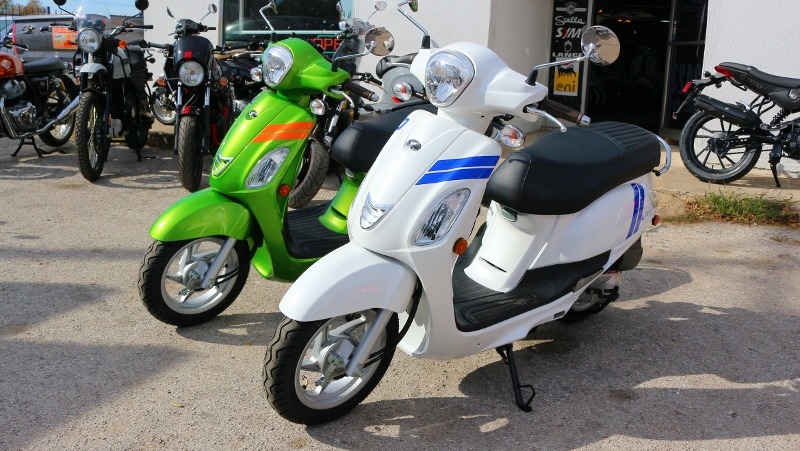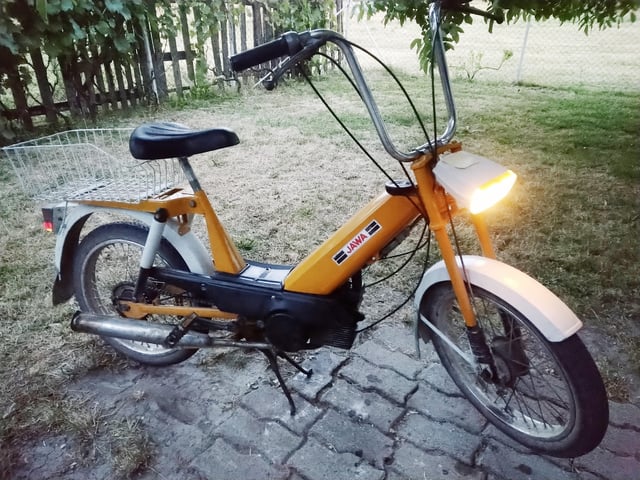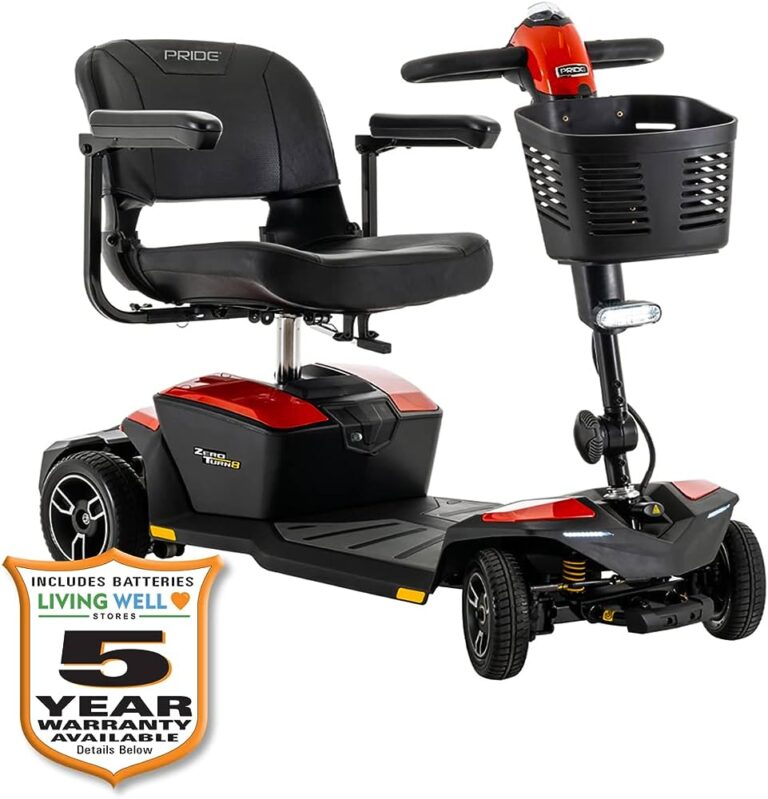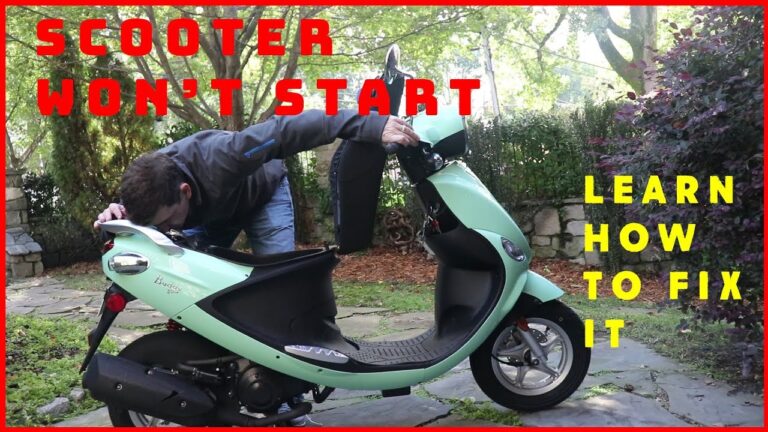Does a Scooter Need to Be Registered? Know the Legal Requirements

A scooter needs to be registered to be operated legally on public roads. Registering a scooter ensures that it meets safety and emissions requirements and allows authorities to track ownership and usage.
When registering a scooter, owners typically need to provide proof of ownership, proof of insurance, and pay registration fees. Registering a scooter also involves obtaining license plates and a registration certificate. Failure to register a scooter can result in fines and penalties.
Therefore, it is important to properly register your scooter to ensure compliance with the law and avoid any legal issues while riding on public roads.
Understanding The Legal Framework
Understanding the legal framework surrounding scooter registration: Learn whether a scooter needs to be registered to navigate the roads legally. Explore the necessary steps and regulations to ensure compliance with the law.
Scooters are an increasingly popular mode of transportation due to their cost-effectiveness, efficiency, and ease of use. However, understanding the legal requirements for scooter registration is essential to ensure compliance with local laws. In this section, we will provide an overview of these requirements, discuss the differences between scooters and other motor vehicles, and explore jurisdiction-specific regulations and variations.
Overview Of The Legal Requirements For Scooter Registration:
- Registration process: Scooters, like other motor vehicles, may need to be registered with the appropriate authority in your jurisdiction. This typically involves submitting specific documents, such as proof of ownership, proof of insurance, and identification.
- Licensing and age restrictions: Depending on your jurisdiction, scooter riders may be required to possess a valid driver’s license or a specific scooter license. Additionally, there may be age restrictions imposed on scooter riders, particularly for those under the legal driving age.
- Displaying registration stickers: Once a scooter is registered, it is common for registration stickers to be issued and required to be prominently displayed on the vehicle. These stickers serve as visible proof that the scooter has been legally registered.
Differentiating Between Scooters And Other Types Of Motor Vehicles:
- Classification based on engine size: Scooters are generally categorized based on their engine size, which varies from jurisdiction to jurisdiction. In some cases, scooters below a certain engine displacement threshold may be exempt from certain registration requirements or granted different privileges compared to larger motor vehicles.
- Design and functionality: Scooters often have distinct design features, such as a step-through frame and a built-in platform for placing feet. These characteristics can help differentiate them from motorcycles and other motor vehicles, leading to specific regulations and requirements.
Exploring Jurisdiction-Specific Regulations And Variations:
- Local laws and regulations: The legal framework for scooter registration varies from one jurisdiction to another. It is crucial to familiarize yourself with your specific locality’s regulations, as they may differ significantly even within the same country.
- Helmet and safety requirements: Many jurisdictions have specific helmet and safety requirements for scooter riders. This may include wearing a helmet at all times, using reflective clothing, or adhering to specific lighting and signaling equipment on the scooter.
- Special considerations for electric scooters: With the rise of electric scooters, some jurisdictions have introduced specific regulations for these eco-friendly alternatives. This could range from restrictions on speed and power output to requiring a separate registration process for electric scooters.
Understanding the legal framework surrounding scooter registration is essential for scooter riders to ensure compliance and avoid potential penalties. By familiarizing yourself with the requirements, differentiating scooters from other motor vehicles, and exploring jurisdiction-specific regulations, you can ride your scooter confidently and legally.
Remember to always stay updated on any changes to the laws in your locality to ensure a smooth and hassle-free scooter riding experience.
Criteria For Registering A Scooter
Registering a scooter is mandatory in most states as it classifies as a motor vehicle. However, registration requirements may vary depending on the region, so it is essential to research and adhere to local regulations to avoid any legal complications.
Scooters have become a popular mode of transportation in recent years, offering convenience and ease of use for many urban dwellers. However, there are several criteria that need to be considered when determining if a scooter needs to be registered.
Let’s take a closer look at these criteria to understand the requirements better:
Determining The Engine Displacement Limit For Registration:
- Engine displacement: Each state may have specific requirements regarding the engine displacement limit for scooter registration. Here are some common limits:
- 49cc limit: Scooters with an engine displacement of 49cc or lower may not require registration in many states, as they are considered mopeds. These scooters typically have a top speed of around 30 mph.
- Different limits: Some states may have different engine displacement limits for registration, such as 50cc or even 110cc. It’s important to check with your local Department of Motor Vehicles (DMV) to determine the specific limit in your area.
Examining Speed Restrictions And Their Impact On Registration Requirements:
- Top speed: In some states, scooters that can reach higher speeds may have different registration requirements. Here’s what you need to know:
- 30 mph or lower: Scooters that have a top speed of 30 mph or lower may not require registration in certain states.
- Higher speeds: However, as the top speed increases, some states may require registration regardless of the engine displacement. For example, if a scooter can exceed 30 mph, it may need to be registered, even if it falls within the engine displacement limit.
Analyzing The Age Restrictions For Scooter Registration:
- Age requirements: Scooter registration may also be influenced by the rider’s age. Here’s what you should be aware of:
- Age restrictions: Some states have age restrictions for scooter registration. For example, individuals under a certain age, such as 16 or 18, may not be allowed to register a scooter, regardless of its engine displacement or top speed.
- Licensing requirements: Additionally, certain states may require the rider to possess a valid driver’s license or a specific type of scooter license to register the vehicle.
Understanding the criteria for registering a scooter can help you navigate the requirements and ensure that you are in compliance with local laws. Remember to check with your local DMV for the specific regulations in your area. Stay informed and ride safely!
Step-By-Step Process For Scooter Registration
Registering your scooter is a step-by-step process that ensures compliance with legal requirements. By following this process, you can avoid penalties and enjoy worry-free rides on your scooter without the need to be concerned about registration.
If you’re considering purchasing a scooter, it’s important to understand the registration process to ensure you can ride legally on the roads. Registering your scooter involves several steps, from gathering the necessary documentation to paying the fees. Let’s walk through the process together:
Gather The Necessary Documentation For Registration
To begin the registration process, you’ll need to gather the following documents:
- Proof of ownership and purchase: This can include a bill of sale, a sales contract, or any other document that proves you are the legal owner of the scooter.
- Identification and personal details: Prepare your valid identification document, such as a driver’s license or passport, as well as your proof of address, such as a utility bill or bank statement. You may also need to provide your social security number or tax identification number.
- Insurance requirements: Many jurisdictions require scooter owners to have insurance coverage. Make sure to obtain a valid insurance policy for your scooter.
Submitting The Registration Application
Once you’ve collected the necessary documents, it’s time to fill out the registration application. The specific forms and requirements may vary depending on your location, but generally, the process involves:
- Completing the application form: Provide accurate and up-to-date information on the application form. Be sure to double-check for any required fields or attachments.
- Verifying the application: Review your application thoroughly to ensure all information is correct, as any mistakes or omissions could delay the registration process.
Paying The Registration Fees And Associated Costs
To finalize the registration, you will need to pay the required fees and any associated costs. These fees typically cover administrative expenses, licensing, and initial taxes. It’s important to check with your local Department of Motor Vehicles (DMV) or relevant authority to determine the exact amounts and accepted methods of payment.
Once you’ve completed these steps, your registration application will be processed, and you will receive your scooter’s registration documents. Remember, it’s essential to keep your registration up to date and carry the necessary documents whenever you are riding your scooter on public roads.
By following these straightforward steps and ensuring you have all the required documentation, you can successfully register your scooter and enjoy riding it legally and hassle-free. Stay safe on the roads and have fun as you explore new adventures with your registered scooter!
Consequences Of Riding An Unregistered Scooter
Riding an unregistered scooter can have serious consequences, including fines, penalties, and legal issues. It is important to understand the registration requirements for scooters to avoid these potential problems. Be aware of the rules and regulations in your area to ensure a safe and legal ride.
Legal Penalties And Consequences For Riding Without Registration:
- Riding an unregistered scooter can result in legal penalties and consequences. Here are some important points to consider:
- Fines and tickets: Operating an unregistered scooter can lead to hefty fines, which vary depending on the jurisdiction and the severity of the violation. In some cases, you may also receive a ticket and have points added to your driving record.
- Vehicle impoundment: Law enforcement authorities have the power to impound an unregistered scooter, leaving you without transportation until you settle the registration requirements and pay any associated fees.
- License suspension: Riding an unregistered scooter may also result in the suspension of your driver’s license or privilege to operate any motor vehicle. This can have significant implications, affecting your ability to commute and complete daily tasks.
- Criminal charges: In some cases, repeated or severe offenses related to riding an unregistered scooter may lead to criminal charges. It’s crucial to understand the legal implications to avoid facing serious consequences in the long run.
- Increased scrutiny: Operating an unregistered scooter may attract additional attention from law enforcement, making you more susceptible to inspection, questioning, and potential legal issues.
Exploring The Potential Risks And Liabilities:
- Riding an unregistered scooter goes beyond legal penalties and can expose you to various risks and liabilities. Consider the following points:
- Lack of accountability: Without proper registration, it becomes challenging to hold anyone accountable in case of accidents or damages caused by your scooter. This can lead to complicated legal disputes and financial burden.
- Limited protection: If you’re involved in an accident while riding an unregistered scooter, you may not have access to insurance coverage. This can leave you personally liable for medical expenses, property damages, and potential legal claims against you.
- Exclusion from certain areas: Some regions or private properties enforce regulations that restrict access to only registered scooters. Riding an unregistered scooter may result in limitations or exclusion from these areas, impacting your mobility and convenience.
- Reduced peace of mind: Riding an unregistered scooter can create unnecessary stress and anxiety, as you’re constantly aware of the potential legal and financial consequences. Registering your scooter provides a sense of assurance and ensures compliance with the law.
Discussion On The Impact Of Lack Of Insurance Coverage:
- Riding an unregistered scooter also means lacking insurance coverage, which can have significant implications. Consider the following points:
- Personal financial responsibility: Without insurance coverage, you may be solely responsible for any damages or injuries incurred by yourself, others, or their property in an accident. This can result in costly out-of-pocket expenses and potentially lead to financial distress.
- Limited medical coverage: In case of personal injuries, you may not have access to medical coverage through insurance policies. This can leave you burdened with medical bills and lack the support necessary for a full recovery.
- Legal complications: If you cause an accident while riding an unregistered scooter and lack insurance, it can lead to lawsuits and legal disputes. It’s important to remember that insurance coverage can provide legal protection and representation in such situations.
- Reputation and credibility: Riding an unregistered and uninsured scooter may harm your reputation and credibility in various ways. Others may perceive you as irresponsible, as you’re not taking necessary precautions to protect yourself and others on the road.
By understanding the potential penalties, risks, and liabilities associated with riding an unregistered scooter, you can make informed decisions and ensure compliance with regulations. Registering your scooter and obtaining the necessary insurance coverage provides peace of mind and protects you financially in the event of an accident.
Benefits And Drawbacks Of Registering A Scooter
Registering a scooter has its benefits, as it ensures legal compliance and peace of mind. However, drawbacks include the cost and time involved in the registration process. Decide whether it’s worth it based on your needs and preferences.
Highlighting The Advantages Of Scooter Registration
- Access to designated lanes or areas: Registering your scooter can grant you access to designated lanes or areas specifically designated for scooters. This can help you navigate through traffic more efficiently, saving you time and frustration.
- Eligibility for parking permits: By registering your scooter, you may be eligible for parking permits that allow you to park conveniently in designated areas. This can be a significant advantage, especially in crowded urban areas where parking is limited.
- Protection against theft or loss: Registering your scooter helps establish legal ownership and can act as a deterrent against theft or loss. In case your scooter is stolen or lost, the registration can facilitate the process of reporting it to the authorities and potentially aid in recovery efforts.
Considering The Drawbacks And Potential Limitations Of Scooter Registration
- Additional costs and fees: Registering your scooter may come with additional costs and fees, such as registration fees, license fees, and insurance requirements. These expenses should be taken into consideration when deciding whether to register your scooter.
- Compliance with ongoing regulations and inspections: When you register your scooter, you need to comply with ongoing regulations and inspections to ensure its roadworthiness. This may involve periodic inspections and maintenance, which can add to the overall cost and effort required to keep your scooter registered.
Remember, while registering your scooter can provide various benefits, it’s essential to weigh them against the drawbacks and potential limitations to make an informed decision based on your specific needs and circumstances. Ultimately, whether to register your scooter or not depends on factors such as your location, intended use, and personal preferences.
Additional Considerations And Exceptions
A scooter may need to be registered depending on the state or country regulations. However, there may be exceptions for certain types of scooters, such as those with lower engine capacities or designated as electric scooters. It’s best to check with your local authorities to determine if registration is required.
Scooters are becoming an increasingly popular mode of transportation, especially in urban areas where traffic congestion is a common problem. If you’re considering purchasing a scooter, you might be wondering whether it needs to be registered like a car or motorcycle.
We’ll explore the regulations surrounding scooter registration and discuss any exemptions or special circumstances that may apply. We’ll also address some common misconceptions and myths surrounding this topic.
Examining The Regulations For Electric Scooters:
- Electric scooters are subject to different regulations depending on the jurisdiction you’re in. It’s important to familiarize yourself with the specific requirements in your area.
- In many places, electric scooters fall into a legal gray area. They are typically classified as low-powered vehicles and may not require registration, licensing, or insurance.
- Some jurisdictions have specific rules regarding the maximum speed and power output of scooters to qualify for exemption from registration.
- Certain areas may have designated scooter lanes or restrictions on where scooters can be operated, so it’s essential to familiarize yourself with local laws and regulations.
Discussing Any Exemptions Or Special Circumstances For Scooter Registration:
- There are situations where a scooter may need to be registered even if it falls below the typical registration requirements. One example is if you plan to operate your scooter on public roads or highways.
- Some places may require scooters to be registered if they exceed specific speed or power limits. It’s crucial to check with your local transportation department to determine if your scooter falls under these regulations.
- Exemptions may be available for scooters used for specific purposes, such as mobility devices for individuals with disabilities.
- Additionally, certain jurisdictions may have different rules for gas-powered scooters compared to electric ones. Make sure to research the specific regulations for your scooter type.
Addressing Common Misconceptions And Myths Surrounding Scooter Registration:
- Myth: Scooters never need to be registered. While it’s true that many scooters don’t require registration, there are exceptions and varying regulations depending on your location.
- Myth: Electric scooters are always exempt from registration. This is not always the case. Some jurisdictions have specific requirements for electric scooters to be registered, especially if they exceed certain speed or power limits.
- Myth: Scooter registration is a complicated and expensive process. In reality, scooter registration is often straightforward and relatively inexpensive compared to registering a car or motorcycle.
- Myth: Insurance is not necessary for scooters since they are smaller vehicles. While insurance requirements for scooters may not be as stringent as those for cars or motorcycles, it is still a good idea to consider obtaining coverage to protect yourself and others in case of an accident.
The need for scooter registration depends on various factors such as your location, scooter type, and intended use. It’s important to research the regulations specific to your area to ensure compliance. Remember to always prioritize safety and follow the rules of the road when operating your scooter.

Credit: www.lawfirmofjeremyrosenthal.com
Frequently Asked Questions For Does A Scooter Need To Be Registered
What Kind Of Scooter Does Not Require A License In Texas?
A scooter that is 50cc or less and has a maximum speed of 35 mph does not require a license in Texas.
What Are The Scooter Laws In Arkansas?
Scooter laws in Arkansas require a valid driver’s license and registration for operating scooters on public roads.
What Kind Of Scooter Does Not Require A License In Ohio?
A scooter with an engine size of 50cc or less does not require a license in Ohio.
What Kind Of Scooter Does Not Require A License In Georgia?
A scooter with an engine size below 50cc does not require a license in Georgia.
Conclusion
Registering a scooter is a crucial step in ensuring legal compliance and safety on the road. Although the specific requirements for registration may vary depending on the jurisdiction, it is important to research and understand the relevant laws in your area.
Registering your scooter not only provides you with the necessary documentation and identification to operate it legally, but also helps in safeguarding against theft and enables authorities to track and recover a stolen vehicle. Moreover, registration may be required for insurance purposes, protecting you financially in the event of an accident or damage.
Additionally, by registering your scooter, you contribute to promoting responsible and accountable usage of electric vehicles, leading to a cleaner and greener environment. So, whether you’re using your scooter for commuting or leisure, make sure to follow the registration process to enjoy a hassle-free and enjoyable ride.






